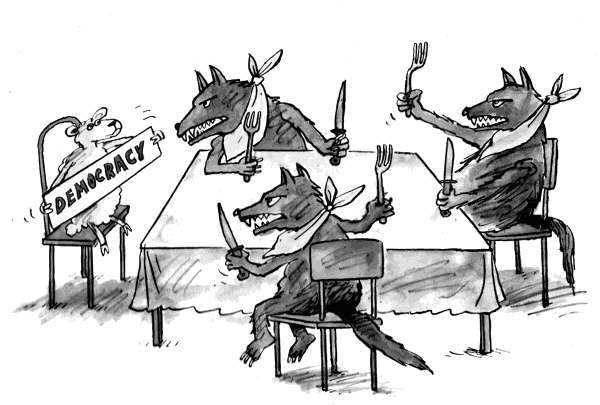
Democracy is also known as “the tyranny of the majority” or the “will of the people” or, perhaps, “democracy flawed.”
By Tom Arms
“Democracy,” Winston Churchill famously said, “is the worst form of government—except for all those other forms that have been tried.”
Then there is democracy unchained, or without the restraints of the rule of law and free speech. Also known as “the tyranny of the majority” or the “will of the people” or, perhaps, “democracy flawed.”
These are elected governments with political leaders who have harnessed to their own pursuit of power a perceived threat to the majority, or a growing, vociferous and politically motivated minority.
There are far too many examples to choose from but let’s focus on Hungary, Russia, Israel, India and the US for starters. In each of these countries, the leaders (or wannabe leader) have won the support of the majority of the population either through lies or by allying themselves with a social movement which promotes one section of society at the expense of another.
Technically speaking, Israel is a democracy with carefully monitored and oft-held elections. Its American supporters are keen to point out that it is the only democracy in the Middle East and this makes the Israelis their only rock-solid ally in the region.
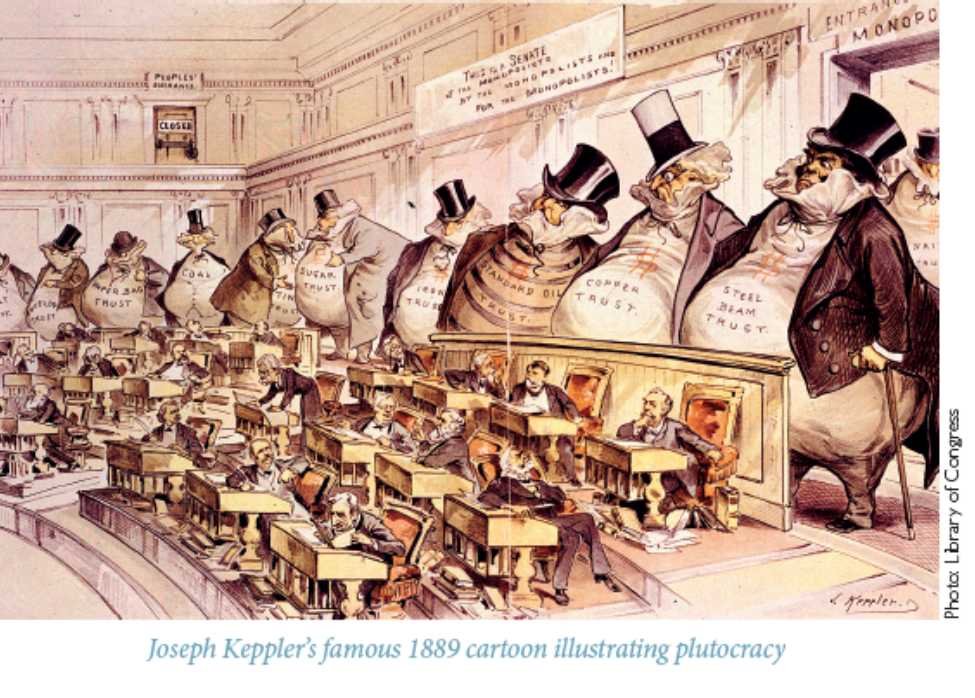 Twenty percent of Israel’s voters are Arabs. As the occupying power, Israel is also responsible for two million Palestinians in Gaza and another two million on the West Bank—none of whom have a vote. Their rights and concerns are totally ignored by Benjamin Netanyahu because his political base is conservative Orthodox Jews. The Israeli Supreme Court has attempted to protect Arab rights. As a result, Netanyahu is beavering away at dismantling the court and its powers.
Twenty percent of Israel’s voters are Arabs. As the occupying power, Israel is also responsible for two million Palestinians in Gaza and another two million on the West Bank—none of whom have a vote. Their rights and concerns are totally ignored by Benjamin Netanyahu because his political base is conservative Orthodox Jews. The Israeli Supreme Court has attempted to protect Arab rights. As a result, Netanyahu is beavering away at dismantling the court and its powers.
Vladimir Putin was recently re-elected President of Russia with 87.5 percent of the vote. Such a large figure is of course suspect, but most observers accept that Putin would have won regardless. He has successfully portrayed himself as the only possible leader of a nation under attack from wicked, grasping Western enemies. His answer is that the best defense is a good offense which means the pursuit of Russian imperial ambitions.
Viktor Orban has cast himself in the role of anti-immigrant, anti-Islamic saviour of ethnic Hungarians and European Judeo—Christian values. “We must state,” said Hungary’s right-wing prime minister, “that Hungarians do not want to be diverse and do not want to be mixed; we do not want our own color, traditions and national culture to be mixed with that of others.”
To enforce these views requires centralized power verging on dictatorial. Fortunately proper democracies are more than just a simple majority vote. They consist of a complex set of checks and balances involving things such as a free press, an independent judiciary, legislative checks with a recognized political opposition, a constitution, a Bill of Rights and the rule of law. Which is why political leaders such as Putin, Modi and Orban start to attack and dismantle these checks the moment they achieve office.
The unchained or flawed democracy threatens to reach its apogee in a Trumpian America. The world was given a taste of it during Donald Trump’s 2016-2020 administration.
Orban has stacked the courts, electoral commission, universities and media with his supporters. The Russian constitution had few checks on presidential powers. But the few that existed have been suppressed by the establishment of a corrupt oligarchical economic and political structure; total state control of the courts and justice system, a rubber-stamp parliament and an emasculated media.
India is billed as the world’s largest democracy. It is just about to start its seven-week balloting process. There have long been stresses between the Hindu Community (roughly 80 percent) and the Muslims (roughly 18 percent). For decades the country overcame the stresses with a strictly secular constitution. Narendra Modi, however, has found it politically advantageous to blatantly favour the Hindu majority at the expense of the Muslim minority.
Modi’s weapon of choice is India’s tax man. If a political opponent becomes too visible then he runs the risk of being accused of corruption and tax evasion. A number of members of the opposition Congress I Party have been accused and investigated. When they crossed the floor and joined Modi’s BJP investigations were dropped. On the eve of the election, the Income Tax Department froze the bank accounts of Congress I.
This unchained or flawed democracy threatens to reach its apogee in a Trumpian America. The world was given a taste of it during Donald Trump’s 2016-2020 administration. Trump and his team were too disorganized the first time around to make much impact other than to divide the nation with his rhetoric—except on the issue of abortion. Donald Trump delighted evangelical Christian supporters by appointing three anti-abortion Supreme Court Justices who reversed the 1973 pro-abortion Roe v. Wade ruling. This is now facing a tsunami of opposition—mainly from women—with 69 percent favoring abortion.
If Trump wins again in 2024 he and his conservative supporters are better organized. They have a plan which has been formulated under the auspices of the conservative think tank the Heritage Foundation. Contributors to what is entitled “Project 2025” are key players from his first term who have learned some of the Washington ropes and have had four years to ponder how to best use them.
The key to their plans is the implementation of what is called unitary executive theory. This is a political theory which says that the president of the United States has absolute power over the executive branch from the moment they are inaugurated. That means he has total control over all the departments of state, federal agencies and every one of the three million employees of the federal government.
It means that he can create and dissolve agencies and departments of state and hire and fire whomever he pleases. Already the US makes more political federal appointments than any other Western democracy—4,000 of them. Project 2025 proposes to sack at least 20,000 federal employees whom they suspect its authors suspect of being “deep state subversives” and replace them with Trump loyalists.
This would make it easier for a second Trump Administration to rollback climate change regulations; increase fossil fuel production; invoke the 1807 Insurrection Act; direct the Department of Justice to pursue Trump opponents in the media, politics, judiciary and academia; reverse LGBTQ, transgender, race and gender rights; encourage Christian nationalism; reduce corporation tax to 18 percent and massively increase deportations—all of which is proposed by the authors of Project 2025 and have been at least been hinted as action points by Donald Trump.
If he wins the presidency, Trump will have been democratically elected by the majority, or at least the majority of America’s Electoral College. But it will be a majority frightened into a belief that their interests are under threat and their only hope is to suppress those threats. That is the tyranny of the majority.
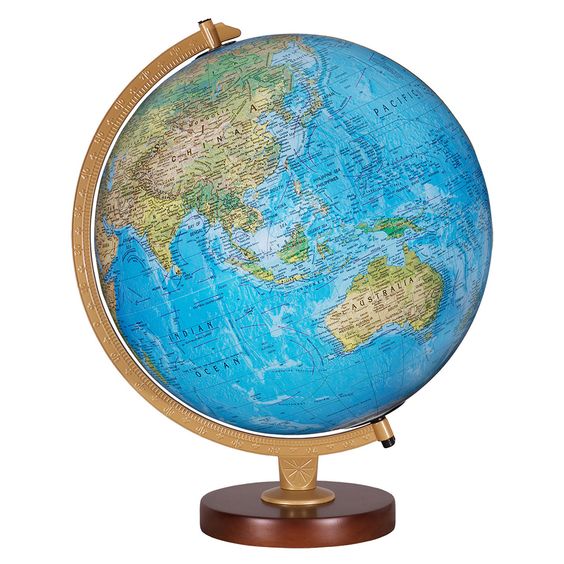 World Review
World Review
A quick round-up on Gaza, Israel, Iran, Yemen, Lebanon, America and everywhere else that is affected by the ongoing crisis in the Middle East.
President Biden’s “outrage” following the killings of World Central Kitchen aid workers resulted in an apology and two new aid routes: The Erez Crossing and the port of Ashdod in southern Israel. Secretary of State Antony Blinken said that as a result 400 aid trucks went through to Gaza immediately after the presidential fury. Un officials said the figure was actually 223.
Disenchanted State Department officials—of which there are a growing number—say that the Israeli Defense Forces (IDF)—backed by the government—are continuing allow only the minimum to go through their blockade.
 Talks between Hamas and Israel have resumed in Egypt, this time brokered by CIA director William Burns. They are still deadlocked. Hamas wants a permanent ceasefire. The US is proposing six weeks. Israeli National Security Minister Itamar Ben-Gvir says that if Netanyahu does not order an immediate attack on Rafah he will “destroy” the Israeli prime minister.
Talks between Hamas and Israel have resumed in Egypt, this time brokered by CIA director William Burns. They are still deadlocked. Hamas wants a permanent ceasefire. The US is proposing six weeks. Israeli National Security Minister Itamar Ben-Gvir says that if Netanyahu does not order an immediate attack on Rafah he will “destroy” the Israeli prime minister.
Meanwhile US intelligence is reporting that Iran is about to launch a major attack on Israel in retaliation for the attack on its consulate in Damascus. In response to this threat, President Biden has declared that America’s support for the continued existence of Israel is “ironclad.” This in turn raises questions about the impact the Gaza situation is having on American cladding.
Israeli foreign minister Israel Katz warned that any attack by Iran on Israel would result in “an attack on Iran.” If America’s military commitment is indeed “ironclad” then the military balance would appear very one-sided. Therefore the most likely Iranian response would be through its Lebanese-based Hezbollah forces. They are armed with hundreds of thousands of rockets and missiles capable of reaching targets in Tel Aviv and Jerusalem.
On the other side of the world, Australian Foreign Minister Penny Wong, said this week that the Australian government is considering recognizing a Palestinian state as the first step towards achieving the two-state solution. She stressed that Australia would not recognize a Palestinian government that included Hamas.This follows on from a similar suggestion from British Foreign Secretary Lord Cameron and a move at the United Nations to change the Palestinians’ status from observer to “member state.”
As of Friday 12 April at 1230 GMT, the Palestine Ministry of Health reported 33,694 Gazans have died since 7 October. These include more than 12,000 children and 8,400 women. A total of 76,214 Gazans have been injured and 8,000 are missing. On the West Bank, since 7 October, 460 Palestinians have been killed, including 117 children. A total of 4,750 have been injured.
***
South Korean President Yoon Suk Yeol lost big time this week. It was election time for the National Assembly and the Liberal Opposition parties won 161 out of the 254 seats. This is just short of the two-thirds majority needed to override the presidential veto and constitutional amendments, but more than enough to give President Yoon a very hard time.
Like so many other political leaders, Yoon’s Achilles heel was the economy. South Korea is suffering the global post-covid and Ukraine-inspired inflation as almost everywhere else. A single apple in an upmarket South Korean grocers now costs $7.
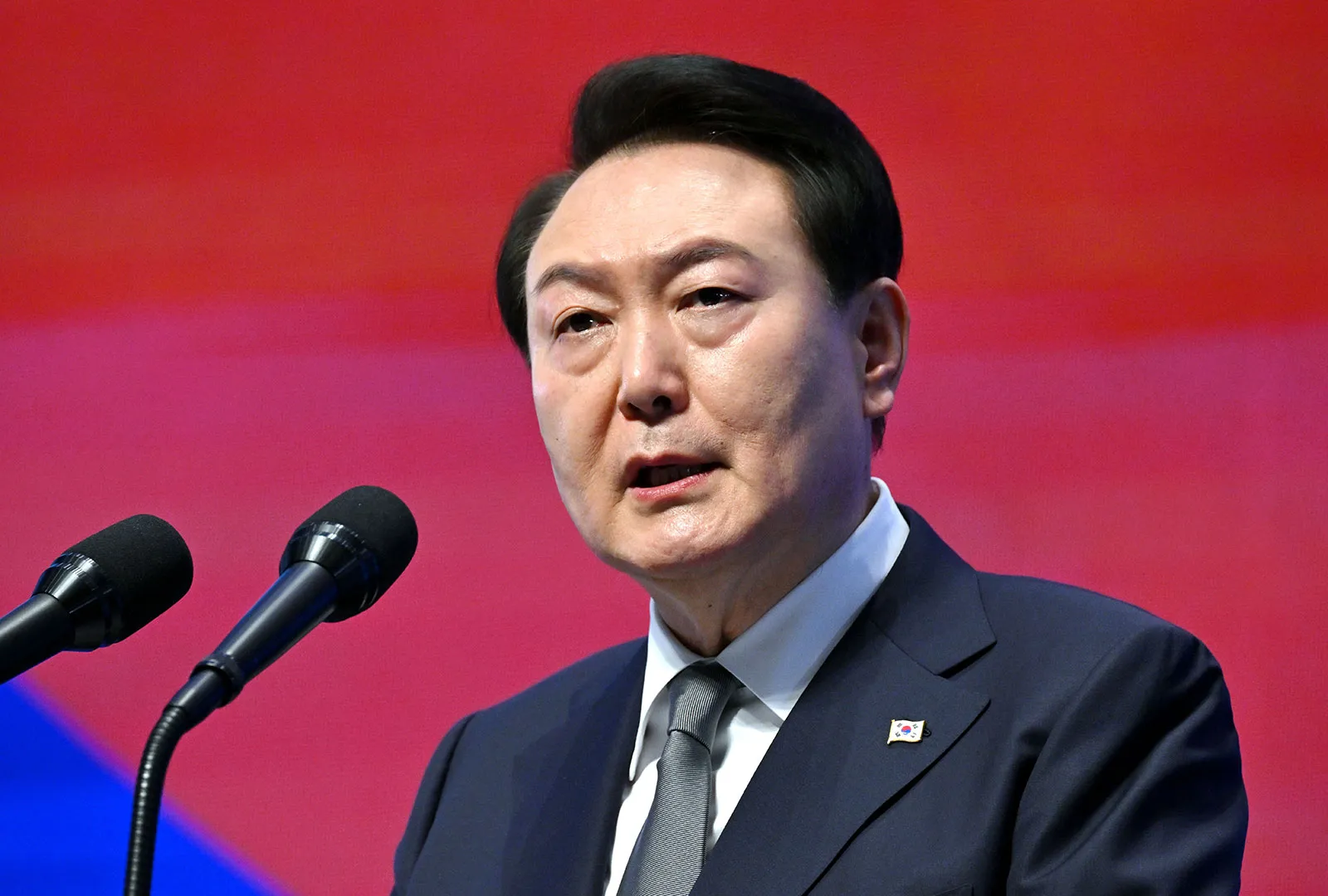 Mind you, Yoon was not a popular choice from the start. When he was elected two years ago his margin of victory was only 0.7 percent. His current approval rating is 30-40 percent and he has never risen above 50 percent.
Mind you, Yoon was not a popular choice from the start. When he was elected two years ago his margin of victory was only 0.7 percent. His current approval rating is 30-40 percent and he has never risen above 50 percent.
To make matters worse, Yoon and his wife have become embroiled in a storm in a handbag. The First Lady was given a Dior bag. She failed to report the gift. When the slip-up was reported in the South Korean press, neither the president nor his wife would accept that she acted improperly. The First Lady has not been seen in public for four months.
But there is a possible upside to President Yoon’s problems. His term has another three years to run. Because of his parliamentary problems he will be unable to have much impact on domestic affairs. Foreign policy is another matter. The president retains statutory authority over foreign affairs. This makes it likely that President Yoon will be focusing more on relations with North Korea, Japan, China and the US.
President Yoon has shown himself to be an accomplished diplomat. Since he took office relations between South Korea and Japan (historically terrible) have blossomed. Yoon has also developed a good relationship with President Biden while maintaining economic links with China. If he can concentrate on building on those foundations his electoral defeat could have a long-term benefit.
***
The Al Massira Dam created the second largest reservoir in Morocco. At least it was. Six years of drought have shrunk by 97 percent the reservoir the dam created. A massive lake is now little more than a puddle.
Al Massira Dam was central to Morocco’s agricultural industry which produces 12 percent of the country’s GDP. Situated halfway between Casablanca and Marrakesh, it also provided drinking water for two of the country’s biggest cities.
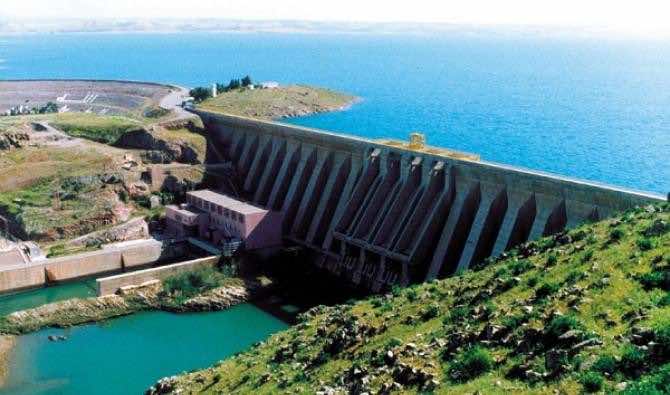 Morocco is one of many of Africa’s drought-stricken climate change victims. The list includes: Ethiopia, Kenya, Djibouti, Eritrea, Somalia, Madagascar, Sudan, South Sudan, Niger and Chad. Millions have been displaced by a merciless sun and the creeping sands of the Sahara. The economic problems created by climate change have in turn exacerbated political difficulties as tribal factions fight for diminishing resources.
Morocco is one of many of Africa’s drought-stricken climate change victims. The list includes: Ethiopia, Kenya, Djibouti, Eritrea, Somalia, Madagascar, Sudan, South Sudan, Niger and Chad. Millions have been displaced by a merciless sun and the creeping sands of the Sahara. The economic problems created by climate change have in turn exacerbated political difficulties as tribal factions fight for diminishing resources.
Morocco Is trying to solve its climate change problems with desalination plants—dozens of them planted on the Mediterranean and Atlantic coastlines. But desalination plants have their own problems. For a start they require large amounts of energy—usually fossil fuels—to power.
Then there is the pollution they create. Desalination plants create a thick brine as a by-product. This is dumped in the sea where it damages plankton and phyto-plankton which are the base food product for all marine life.
___________________
 Tom Arms is the foreign editor of Liberal Democrat Voice and the author of “The Encylopaedia of the Cold War” and “America Made in Britain.” He is also co-host of the world affairs podcast “TransAtlantic Riff.”
Tom Arms is the foreign editor of Liberal Democrat Voice and the author of “The Encylopaedia of the Cold War” and “America Made in Britain.” He is also co-host of the world affairs podcast “TransAtlantic Riff.”